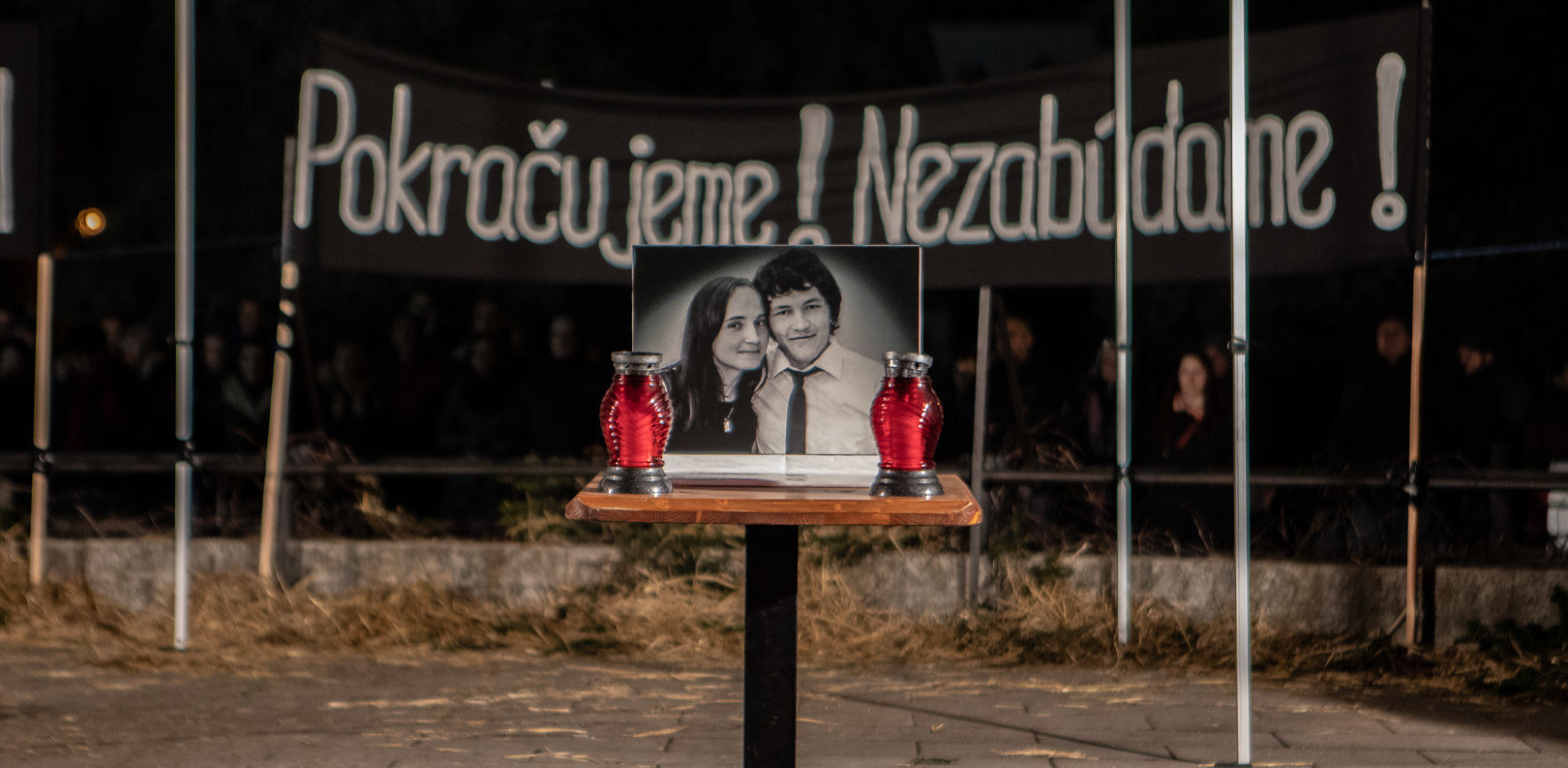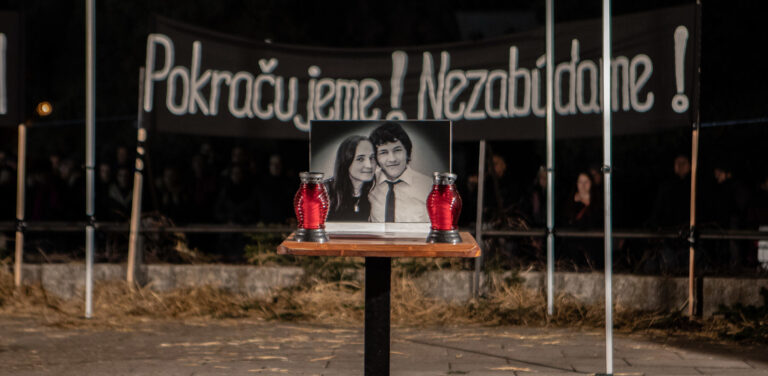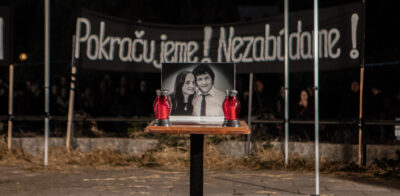More than a year after a special prosecutor in Slovakia charged Marian Kočner with ordering murders of investigative journalist Ján Kuciak and his fianceé Martina Kušnírová. Kočner threatened Kuciak months before the murder. Despite Kuciak´s request, the police did not react. According the special prosecutor, the official motive of Kočner was Kuciak´s investigative reporting. Read the whole story how the newsroom and Slovak society has changed since the day of the murder.
I am walking through the Slovak National Uprising Square in Bratislava, where the Public Against Violence monument is situated. The well-known V-shaped symbol is surrounded by several photos of Ján and Martina and hundreds of candles. People stop and shake their heads. It is 21 February 2019, and I have a feeling I am going through the very same day when I found out Ján and Martina had been murdered.
I am going to a newsroom of Aktuality.sk, where Ján used to work, the same way like I did a year ago. There is a table with burning candles before the reception and again, I feel the same burden on my arms as then. I go upstairs, to the first floor. Despite the memories, something has changed. There is no police officer reading a magazine in front of the newsroom. Therefore, nobody is suspiciously asking me who I am and who I am going to meet. I can see through the glass doors that almost all newsroom members are in black, but mourning mood does not rule there. A charismatic editor-in-chief Peter Bárdy makes jokes and entertains the entire office.
We are sitting in the same room as last year. This time, Bárdy is relaxed and responds promptly to all my questions. He seems to have heard them a thousand times. “I hoped that after we had released a book about Ján and Martina, nobody would ask anything else. Everything was written. But I understand, I am a journalist too,” he laughs, and he continues answering: “Nowadays, we have to answer lots of questions. I usually spend four hours a day on interviews and I don’t have enough time to work. It’s hard, but we owe it to Ján and his family.”
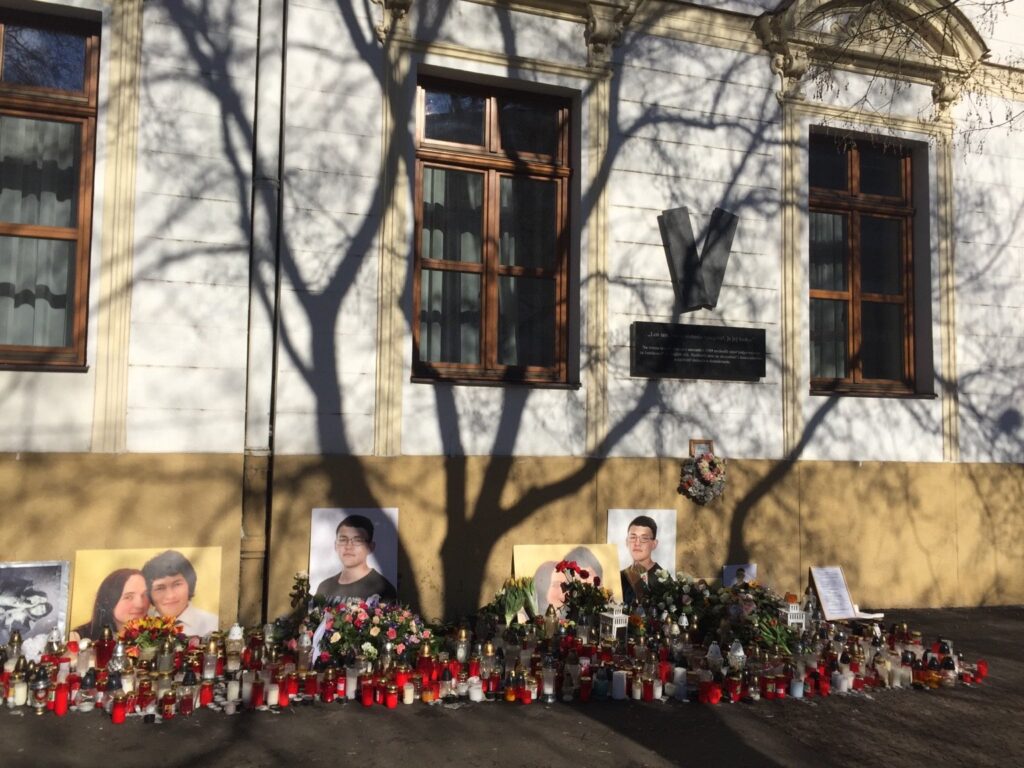
Public Against Violence sign at the Slovak National Uprising Square, photo: Eva Kubániová
Some people are irreplaceable
One would say that after such media attention, the newsroom became blunt after the tragedy. “I do not think we dealt with the situation completely. Rather, I think we have started to understand more what happened. In the first weeks and months after the tragedy we realized our friend was killed, then we gradually became aware that they also killed our colleague, and lately we realized they murdered a great analyst. There were the three stages we needed to go through. We can not just deal with it, but some things have to be resolved. We have to find someone who would do Ján’s job. Despite the fact that we hired new very clever journalists, basically up to three people have to do Ján’s work. Life shows that some people are irreplaceable, not just as humans but as professionals.”
Although the attention and support of Aktuality.sk readers has grown after the murder of its core journalist, but not so dramatically according to the editor-in-chief. The young newsroom had been followed by a large number of readers before. Peter Bárdy sees the biggest change in the popularity of investigative journalism. “Let’s be honest, investigative journalism was not so popular before Ján´s death. We had been publishing investigative articles in the past, but people didn’t read them. They did not attract them. However, Ján’s murder has raised the importance of investigative and data journalism based on facts. People believe that we do it honestly, not to publish clickbait articles and make more money.”
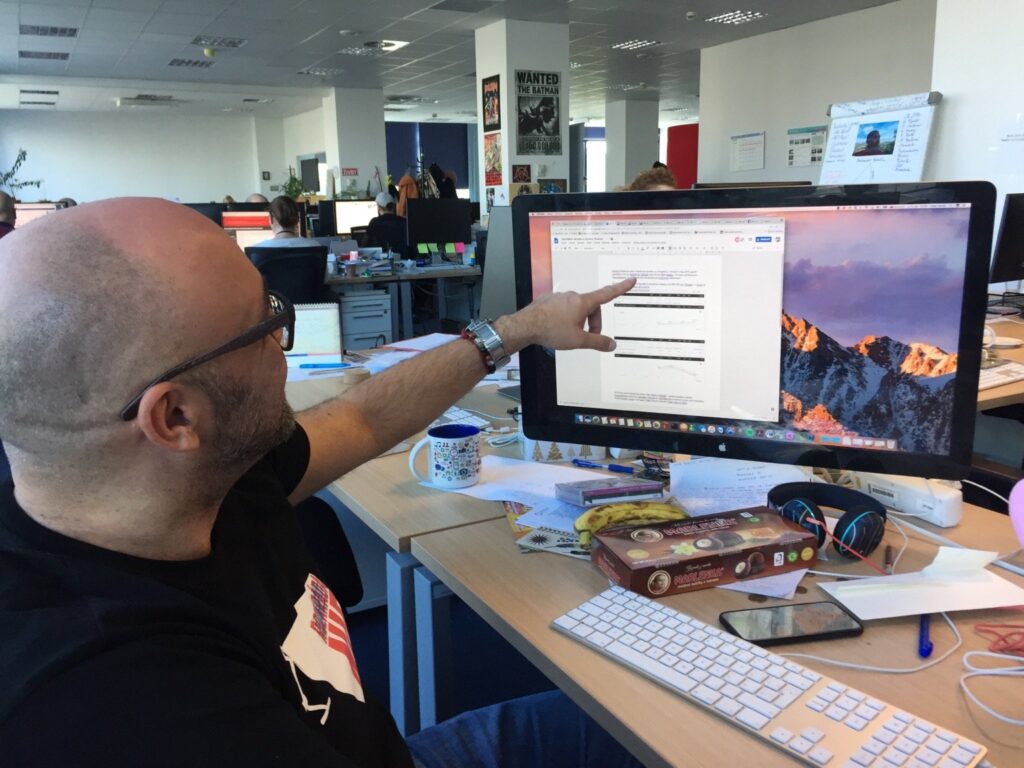
The editor-in-chief of Aktuality.sk Peter Bárdy, photo: Eva Kubániová
The editors have an internal agreement that articles related to Ján´s murder are marginal and carefully chosen. Slovak police has criticized the media several times for publishing leaked documents from the investigation file. The media argued that they are publishing in the public interest, especially in the case of a dead journalist. Peter Bárdy has his own opinion based on experience: “I would not forgive myself if a prosecutor came to me in two years’ time and said that the offenders could not be punished because of the articles we published.” The newsroom wants to keep the public pressure by publishing topics initiated by Ján before his death. The editor-in-chief is so proud to say that everyone in the newsroom wants to participate in investigative cases, which has become a core of their work orientation.
I refuse to mourn more
Mental deprivation is nevertheless perceptible. Year after, there are photos of Ján, posters and badges #allforjan and dozens of books published recently about Ján and Martina’s lives. The dead are omnipresent and cannot be overlooked. “We have started to censor ourselves. When Ján’s photo is on the homepage, I cannot look at his face. Why isn´t there anything else?” The editor-in-chief asks colleagues, irritated. But they argue it must be there… “No, it does not! (…) It’s not easy for us. When I go to work, I pass by Ján and Martina’s photos at the Slovak National Uprising Square and always turn my head to the burning candles. Or when I drive a car from Žilina, I will stop at the cemetery near Štiavnik, where Ján is buried. I have him in my head every day, but I refuse to mourn more. It’s not out of disrespect for Ján, but we are all tired of it. People are constantly asking us whether we continue in Ján’s work. Of course, we do. It was our joint work. We all came here to do investigative journalism, and then Ján died. It does not mean investigative journalism died with him. There is no time to cry and lament. He will be always with us, but we have to go further. He would probably give us a slap if we didn’t move on.”
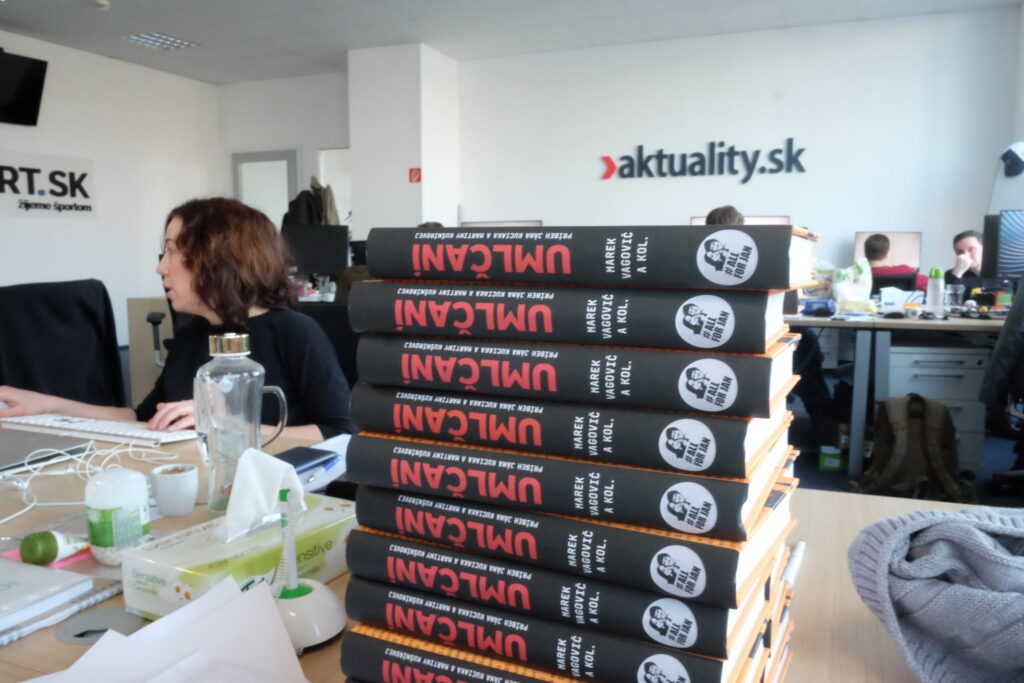
The books “Umlčaní” in newsroom of Aktuality.sk, photo: Eva Kubániová
The words about the newsroom´s cohesiveness are not all gas and gaiters. About four o’clock in the afternoon, the newsroom is getting empty. Its members are taking part in a commemoration event organized by activists from the For Decent Slovakia movement. The organizers beat the historic record of Slovakia, with more than 100,000 people taking part in a demonstration at one of last year’s protests. The first and main demand was now repeated one year after the murder: “An independent investigation of the murder of Ján and Martina”. The annual rally filled up the square again. According to the organizers’ estimates 25,000 people participated in the meeting. In addition to the capital, Ján and Martina’s commemoration was celebrated in another 35 cities in Slovakia and 23 worldwide.
“To silence the media is the first step to establish a dictatorship or other form of authoritarian state. We will do all we can to prevent it from happening,” said one of the speakers Arpád Soltész at a commemoration event in the second biggest Slovak city Košice on Thursday.
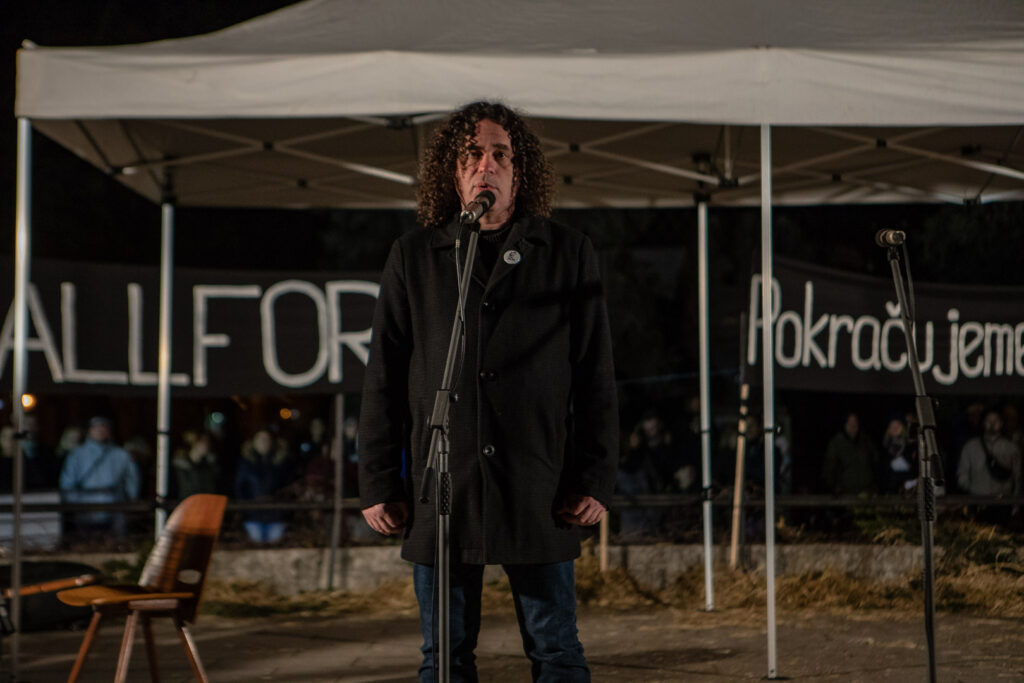
Arpád Soltész speaking at the commemoration event in Košice, photo: Görgy Szaszák
Investigative hope for Slovakia
An experienced journalist, Soltész met Ján at the Hospodárske noviny daily, where they both worked. They usually met at weekly meetings and the young journalism student Ján had already shown his excellent analytical thinking. The death of the young couple touched Soltész deeply. He also felt that Ján’s investigative work would not end by his death. He decided to establish Investigative Center of Ján Kuciak (ICJK) with two other journalists Petr Bárdy and Zuzana Petková in autumn 2018.
“Slovakia was the only country in the Central European region where such a center did not exist yet. Pavla Holcová wanted to set up a similar center by Ján. He was the first Slovak journalist to cooperate internationally. Maybe that´s why he was producing extraordinary results. He was so good at it that it became fatal. If Ján had not been assassinated, I am sure he would establish the center by himself in a year or two. But at that moment, he feel lack of experiences,” explains Arpad Soltész.
The birth of the center itself was not easy. The two founding members, Peter Bárdy and Zuzana Petková, could not be full time members due to time and management duties in other media. But Soltész did not want to give up his idea: “It was very slow and complicated, and finally, Pavla Holcová, who helped us initially, accelerated the whole process. I think, the center would never start without her help. Today, she is a member of the board of directors,” says Soltész about the hard beginnings.
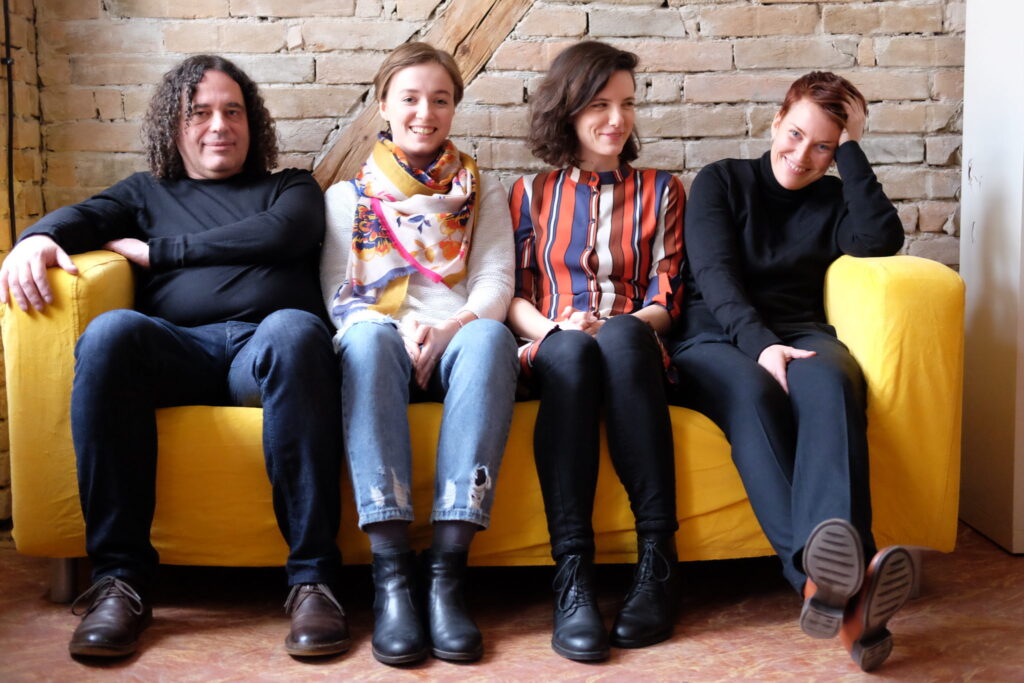
Arpád Soltész, Nikola Gajdošová, Katarína Jánošíková, Pavla Holcová, photo: ICJK
Founding ICJK was announced on January 8, 2019 and currently the center has 3 members. Arpád Soltész is the director, Katarína Jánošíková is currently the only journalist, Nikola Gajdošová takes care of fundraising and organizational management.
“I had no expectations. I thought it would be enough to come to the center once every two weeks for two hours and check if everything is going on. I was naive,” laughs Soltész himself and continues: “I hoped it would be much easier – less bureaucracy, less discussion with people. Then I understood that if we want support from people, and I do not mean only financial one, we need to talk to people and explain them our vision. I was pleasantly surprised how many people and companies are willing to provide us with free services that are often a question of our future existence. For example, we have access to Finstat.sk data (data about companies, their accounting, and other economic data – Vsquare note), which are alpha and omega of investigative journalism. They even offered us to consult with their own analysts. We also appreciate this form of support. We are a small team, but with great potential.”
In the future, they would like to have more team members, but it all depends on the support of readers and financial resources. Like other partner investigation centers in Europe, Soltész refuses to charge for website contents or open up for advertising. “We have chosen a different funding model than large newsrooms have. We do not want to compete with anyone, we want to work together. We indeed need to cooperate with our Slovak colleagues and support each other. We would also like to publish our findings in mainstream Slovak media,” Soltész emphasizes the importance of media collaboration.
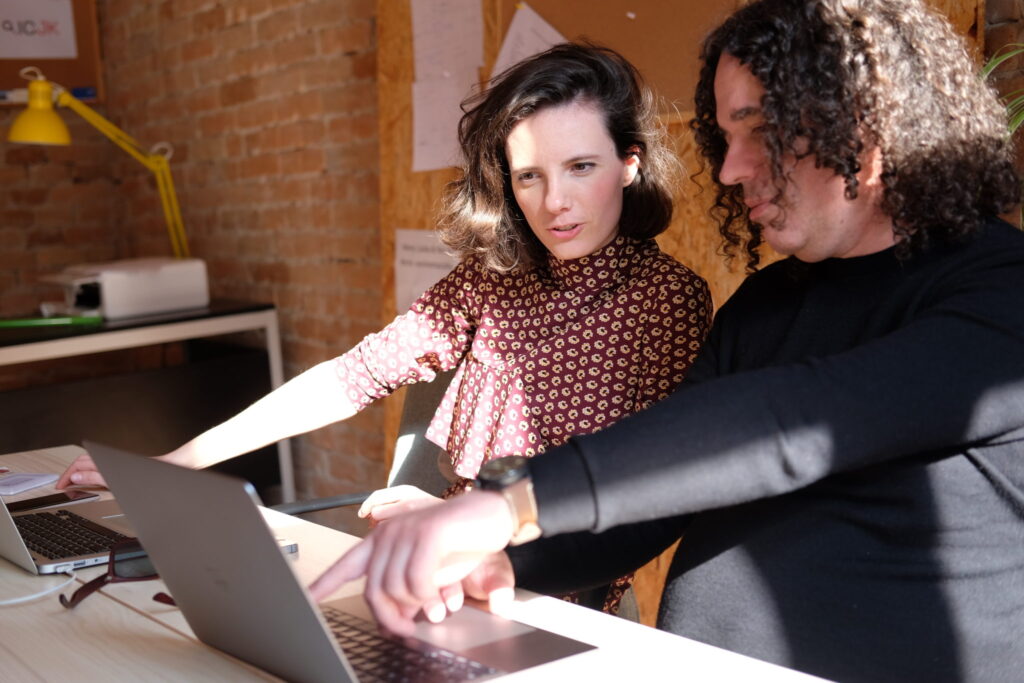
Katarína Jánošíková and Arpád Soltész, photo: Eva Kubániová
Tribute to Ján is our work
The only writing journalist, Katarína Jánošíková, does not participate in ICJK´s fundraising and organizational affairs. She is a former reporter of Slovak public TV who sees her new investigative role as a big challenge: “We made a leap in the dark. When I was working in TV news, everything was running very fast. Here in the center, I feel guilty sometimes to not publish an article for a longer period. But I gradually realized that it would not go so quickly. Investigative articles do not arise from day to day or week to week. Our work is also a huge responsibility for journalism itself, but also for the name, which the center is devoted to.”
Although the name of Ján Kuciak will be an integral part of the existence of the first investigative center in Slovakia, I cannot even see the slightest mention of him or his photo in the newsroom. “His name is a really strong symbol and, at the same time, it is binding us,” explains the ICJK director Soltész, “but we do not want to misuse it or to hide behind it. That’s why we said we would have no Ján’s photos or similar sentimental decorations here. We know who we are and what we do. It’s enough for us. The tribute to Ján is our work, not his face on the poster.”
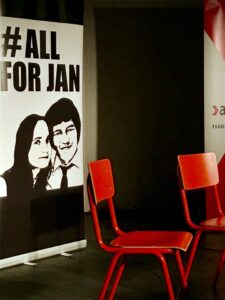
Discussion „A year after“, photo: Lukáš Smrž
The twenty-five thousand crowd disappeared in the streets around the Slovak National Uprising Square in Bratislava around 7 o’clock in the evening. A few dozens of people are going to a discussion entitled „A year after“ organized by Aktuality.sk. Representatives of different areas are changing on the stage – one of the directors of the National Criminal Agency (NAKA) Branislav Zurian, investigative journalists Zuzana Petková and Monika Tódová, one of the main organizers of the protests For Decent Slovakia Juraj Šeliga. About thirty-minute discussion blocks are separated by songs by the most famous Slovak rappers. The debates take place in the atmosphere of Bárdy’s afternoon promise – he will not mourn. Both moderators and guests are making a balance of the year of great changes. Changes which were initiated by a great human tragedy, but they could bring a new hope for justice in Slovakia.
Eva is a journalist working for investigace.cz based in Prague. Investigace.cz is NGO covering organized crime topics and the only Czech partner of OCCRP. She works on projects connected to Slovakia.

